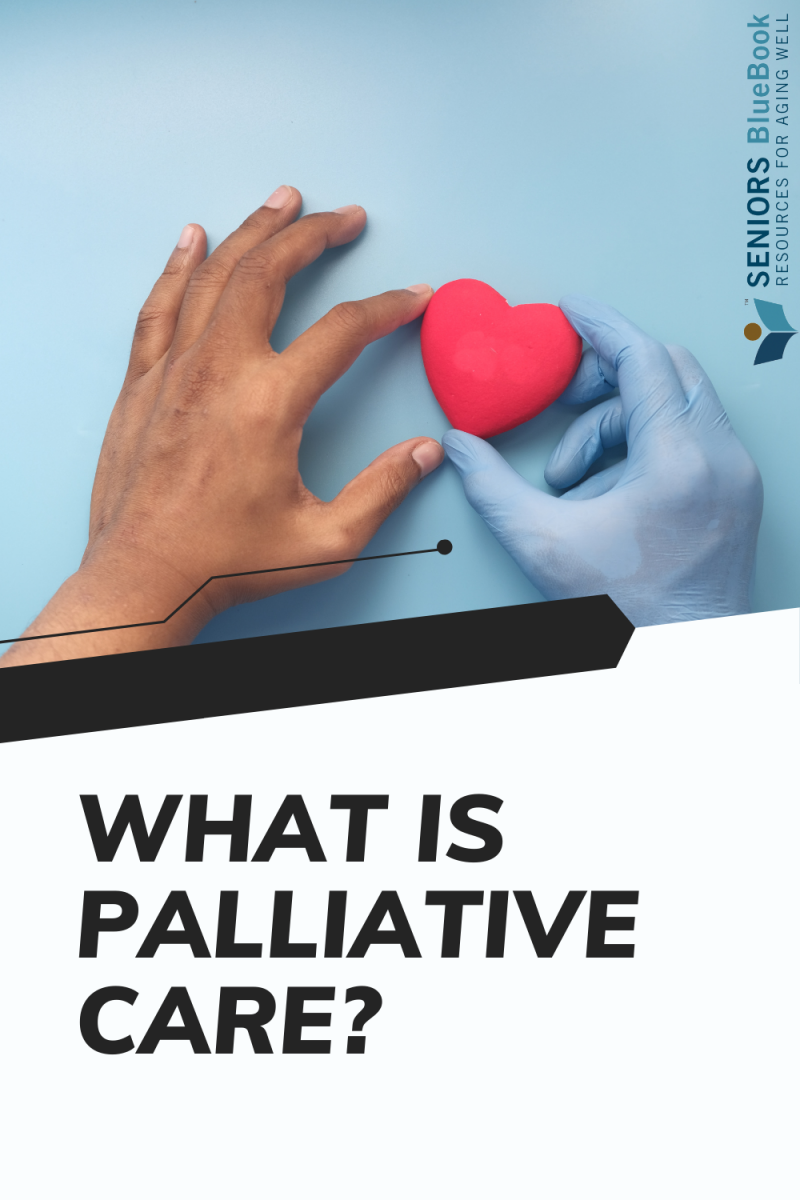What is Palliative Care?
HomeWell Care Services
Jan 07, 2022
Florida - Sarasota, Bradenton & Charlotte Counties
Email US
Click to Email UsIf you have a loved one living with a serious disease like cancer, heart disease, lung disease, Alzheimer's, multiple sclerosis and ALS, you may be among the millions of American families who would benefit from palliative care.
Palliative care eases the everyday symptoms and side effects of serious illness, and can reduce emergency room visits and medical costs. Crucially, it can often be administered at home or in an outpatient clinic, enabling sick people to remain safely in the comfort of their home.
Because palliative care is a relatively new specialty, however, many families don't know about it.
What is palliative care?
Palliative care is comfort care that treats the symptoms and side effects of an illness, rather than the illness itself. Palliative care can start at any stage, and often goes hand-in-hand with curative or life-prolonging treatment, which is what distinguishes palliative care from end-of-life hospice care.
Palliative care is managed by a team of specialists, typically a doctor, a nurse and a social worker. This team takes a holistic approach that includes your loved ones quality of life and emotional wellbeing. As well as focusing on symptoms and pain, palliative teams are trained to help people manage issues like anxiety, depression, fatigue and difficulty sleeping.
Palliative care is effective .Studies indicate that patients who receive it are less likely to be hospitalized for emergencies, more likely to feel satisfied with their care, and more likely in cases of terminal illness to spend their final months at home.
Living with a serious illness at home
Increasingly and especially since the pandemic people are making the choice to face serious illnesses or declining health in the familiar environment of home. While palliative care makes this easier, it isn't always enough, especially for family caregivers.
Too often, the demands of caregiving become too much to handle. As a family caregiver, its easy to become overwhelmed or burned out, or experience a diminished relationship with your loved one due to the stresses of caregiving.
At this point or ideally before families should seek out specialized in-home care, such as HomeWell's Palliative Care Support program. Our program offers a personalized schedule of in-home care and companionship that complements your loved ones palliative or hospice care plan and helps relieve you from the demands of everyday caregiving.
Palliative Care Support is designed to support both your loved one and your family, with caregivers who can help minimize pain and other symptoms, assist with personal care to minimize stress, and provide medication reminders for pain management. Our team is also there to support you when you feel overwhelmed, offering strength, comfort, and a shoulder to lean on.
If you choose to explore in-home palliative care support, look for an agency with a Care Manager who can liaise with your loved ones palliative or hospice team. Ask about how they choose your family's caregivers, as a good match is essential for true companionship and reassurance.
Getting started with palliative care
If your'e unfamiliar with palliative care, ask your doctor or social worker about palliative care services in your area and how to get them.
You can find more information at Get Palliative Care, WebMD and the Center to Advance Palliative Care.
Other Articles You May Like
Transitioning from Assisted Living to a Nursing Home Care; An Inclusive Handbook
As people grow older and their care requirements evolve, there may come a point where transitioning from assisted living to a nursing home is needed. Making this choice can be tough as it involves weighing factors, like health, safety and overall well being. In this article we discuss the different considerations for determining the time to switch from assisted living to a nursing home, the process of transitioning, and how Seniors Blue Book can serve as a valuable resource during this transition. Key Factors to Keep in MindHealthcare Needs; One crucial aspect is assessing the individuals healthcare needs. If the person requires medical attention and monitoring beyond what assisted living offers, moving to a nursing home might be more suitable.Activities of Daily Living (ADLs); It's important to evaluate whether the individual can independently carry out daily activities like bathing, dressing and using the toilet. If these tasks become too challenging in an assisted living setting, opting for a nursing home with enhanced care could be necessary.Safety Considerations; Safety plays a role in this decision making process. If a person faces a risk of falls or other mishaps due to cognitive limitations they might require the level of supervision and safety measures provided in a nursing home.Caregiver Fatigue; When family members or assisted living caregivers feel overwhelmed from the responsibilities of looking after someone it could signal the need to consider moving them to a nursing home where their care requirements can be better addressed. The Transition JourneyMoving from living to a nursing home can be intricate and emotional. Here are some steps to think about...Evaluation; It's important to conduct an assessment of the individuals care needs to determine if transitioning to a nursing home is the decision.Communication; Maintaining honest communication with the individual, family members and healthcare providers is crucial throughout this transition phase. Planning; Thoughtful planning plays a role in ensuring a transition. This may involve coordinating with nursing home staff facilitating the transfer of records and organizing the persons belongings.Support; Providing support for both the individual and their family members is vital during this period. Counseling sessions and participation, in support groups can offer assistance.Adaptation; It's crucial to give the person time to get used to their environment and daily routine at the nursing home. How Seniors Blue Book Can Be of Assistance:Seniors Blue Book serves as a source of information for individuals and families navigating the transition from assisted living to a nursing home. Here's how Seniors Bluebook can offer support: Extensive Directory; Seniors Blue Book presents a directory of nursing homes providing information on services, facilities, costs and contact details. This directory helps individuals and families in finding a nursing home that aligns with their requirements and preferences.Professional Advice; Seniors Blue Book offers expert advice and resources to guide individuals and families through the transition process. Their team of professionals can offer tailored recommendations based on needs and preferences.Educational Materials; Seniors Blue Book provides materials and articles covering topics related to nursing home care, including the transition process, caregiver assistance well as legal and financial planning. These resources assist individuals and families in making informed decisions regarding nursing home care. To sum up the decision to transition from assisted living to a nursing home one should consider factors such as healthcare needs, activities of living (ADLs), safety considerations, as well, as caregiver stress levels.Seniors Bluebook is a resource that provides information and support to assist individuals and families in navigating this difficult transition, with assurance.
Credit shelter trusts
A credit shelter trust is an estate-planning strategy for married couples. This type of trust may provide control over the assets for the creator of the trust and tax efficiency for the surviving spouse and beneficiaries. It is also sometimes known as a bypass trust or family trust. A credit shelter trust allows you to set aside a certain portion of your assets upon your death. There are a variety of reasons to discuss a credit shelter trust with your estate-planning attorney. Control over assets The spouse who sets up the trust can determine how the assets will be distributed. The surviving spouse can receive income and principal from the trust during his or her lifetime. When he or she passes away, the remaining amount in the trust goes to the beneficiaries designated by the spouse who created the trust. This type of trust can be helpful in cases where the creator of the trust wants to control the distribution of the assets after his or her death. This is common with second or later marriages, where the creator of the trust has his or her own children and would like for them to inherit their separate assets. Creditor claims protection A credit shelter trust can help protect assets from claims by divorcing spouses, spouses from subsequent marriages and creditors. Generally, creditors cannot access the principal in the trust to meet their claims against the trust beneficiaries. Federal estate tax exclusion A credit shelter trust allows a married couple to benefit from the federal estate tax exclusion of the first spouse to die so trust assets are sheltered from future estate tax. Any growth or appreciation of those assets while in the trust is similarly protected from estate tax. A portability provision gives married couples a chance to save an unused exclusion amount without a credit shelter trust (see Federal Estate Tax and Portability in the blue section to the right). However, assets passed via portability are not protected from generation-skipping transfer (GST) taxes, nor do they have the control or creditor protection advantages of a credit shelter trust. State estate tax exclusion Several states have their own state estate tax in addition to the federal estate tax. A credit shelter trust may be the only option to use the state estate tax exclusion of the first spouse to die. Federal estate tax and portability The American Taxpayer Relief Act of 2012 updated the federal estate tax exclusion amount and provided for occasional increases to offset inflation. The Tax Cuts and Jobs Act enacted in 2017 made increases to the exclusion amount through 2025. In 2024, you may be able to transfer up to $13.61 million (up from $12.92 million in 2023) at your death free from federal estate tax. Any amount exceeding the exclusion can be taxed up to 40%. The portability provision states that when a person passes away, the surviving spouse may retain the deceased spouses unused exclusion amount. For instance, if a husband dies in 2024, his wife may be able to use their full $27.22 million exclusion (up from $25.84 million in 2023) without planning for it. There are certain tax-filing requirements that must be satisfied to take advantage of this option. You should talk with your qualified tax advisor about your situation. Proactive planning can help ensure you have control over your estate and benefit from tax- saving strategies. You may think the portability provision means you dont need to plan to protect your legacy and reduce estate tax; however, that may not necessarily be the case. Although portability, in some situations, may provide advantages to some married couples, considering a credit shelter trust could have benefits for you and your family. You should work with your estate-planning attorney and tax advisor to determine the appropriate plan for you. Portability (transfer to spouse) Credit shelter trust The surviving spouse has full access and control over all the assets. The spouse who sets up the trust designates the beneficiaries. The surviving spouse and/or other beneficiaries may receive benefits from the assets in the trust during their lifetimes. Growth of the assets may be subject to estate taxes when the surviving spouse dies. Growth of the assets in the trust generally is not taxed for estate tax purposes upon the death of the surviving spouse. Assets can be subject to creditor claims. Assets are typically protected from creditor claims. Assets may be subject to state estate taxes. Assets may not be subject to state estate taxes. All assets, including those from the first spouse to die, generally get a full step-up in cost basis at the surviving spouses death. Assets do not get a step-up in cost basis at the surviving spouse's death. Portability exclusion does not apply to federal GST taxes. With proper planning, assets may not be subject to GST taxes. What is a step-up in cost basis? Cost basis generally is the price you paid for an asset. If you buy a stock for $5 per share, your basis is $5. If you still own that stock at death and the fair market value is $10, your estate may get a step-up in basis to the fair market value at your death. So, your estate holds the stock with a $10 basis, allowing your estate to pass assets to your beneficiaries at the new basis or to sell the asset, potentially without capital gain. This typically means less income tax burden for your beneficiaries as they inherit your assets. Review your plan regularly During the past 10 years, estate tax laws have constantly changed. Thats why its important to remain diligent when working toward your long-term investing and estate goals. Its important to review your estate plan every three to five years. You should also review it when changes in estate tax law occur or when your life circumstances change, such as a birth, marriage, divorce or death in the family. Chad Choate III, AAMSTM Financial Advisor 828 3rd Ave W Bradenton, FL 34205-8665 941-462-2445 Your estate-planning attorney, tax advisor and financial advisor can work with you to determine whats best for your situation.
Local Services By This Author
HomeWell Care Services
Home Health 3406 Magic Oak Lane, Sarasota, Florida, 34232We know there is no place like home. That's why we bring the highest quality of care right to your front door. With a personalized care management approach and a dedicated team of compassionate caregivers, you can expect more from HomeWell. Please call us at 941-303-5642 for more information.
HomeWell Care Services
Non-Medical 3406 Magic Oak Lane, Sarasota, Florida, 34232We know there is no place like home. That's why we bring the highest quality of care right to your front door. With a personalized care management approach and a dedicated team of compassionate caregivers, you can expect more from HomeWell. Please call us at 941-303-5642 for more information.


